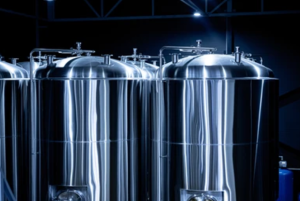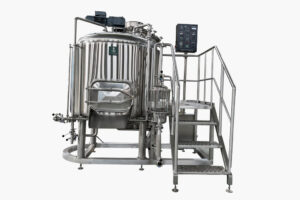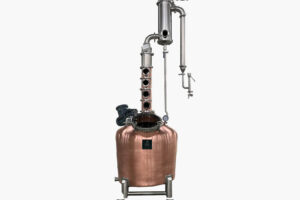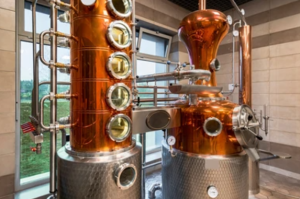COPYRIGHT © 2022 NingBo COFF Machinery Co., ltd. ALL RIGHTS RESERVED
Menu
Categories
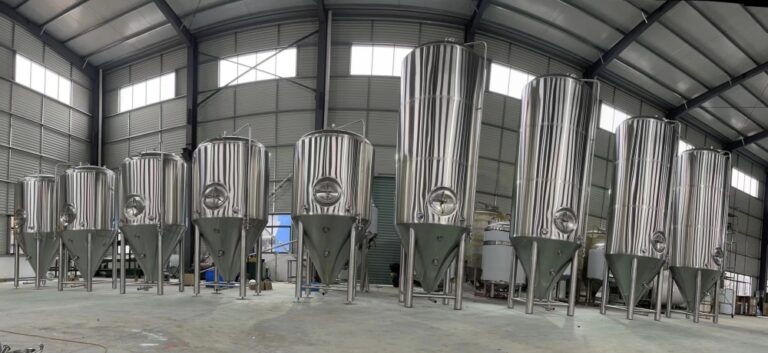
Maintaining your brewery fermenter is crucial for producing high-quality beer. Regular cleaning and sanitizing prevent contamination and off-flavors, ensuring each batch meets your standards. Neglecting maintenance can lead to bacteria and wild yeast infiltrating your fermenter, causing spoilage and equipment failure. By keeping your fermenter in top condition, you safeguard the flavor and aroma of your beer, avoiding potential disasters like soured beer or bottle bombs. Proper maintenance not only enhances the brewing process but also protects your investment in brewing equipment.
Key Takeaways
- Regular cleaning and sanitizing of your fermenter are essential to prevent contamination and off-flavors, ensuring high-quality beer.
- Implement a daily cleaning routine that includes rinsing, applying a suitable cleaner, and thorough rinsing to maintain your equipment’s integrity.
- Choose the right sanitizer, such as Star San or Iodophor, and follow proper application techniques to eliminate harmful microorganisms.
- Regularly inspect seals and gaskets for wear and tear, replacing any damaged components promptly to prevent leaks and maintain brewing efficiency.
- Calibrate thermometers and gauges regularly to ensure accurate temperature monitoring, which is crucial for consistent fermentation results.
- Incorporate lubrication of moving parts into your maintenance routine to reduce friction and extend the life of your equipment.
- Maintain a detailed log of all cleaning, inspections, and repairs to stay organized and ensure no maintenance tasks are overlooked.
Cleaning Your Brewery Fermenter
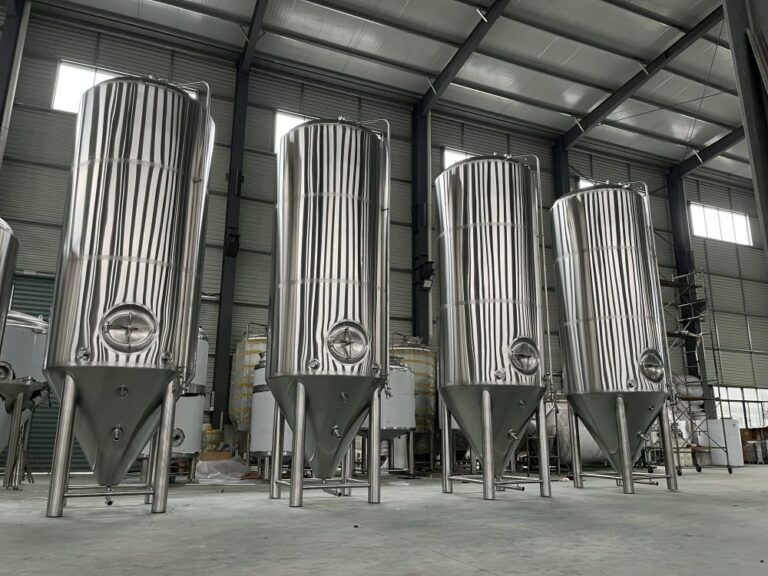
Maintaining a clean brewery fermenter is essential for producing high-quality beer. Regular cleaning ensures that your equipment remains free from contaminants that could spoil your brew. Let’s explore the daily and deep cleaning routines that will keep your fermenter in top condition.
Daily Cleaning Routine
A daily cleaning routine is crucial for preventing residue buildup in your fermenter. After each use, you should rinse the fermenter with hot water to remove any leftover materials. This step helps eliminate sugars and proteins that could harbor bacteria. Use a mild dish soap or a brewery-specific cleaner like PBW (Powdered Brewery Wash). These cleaners effectively remove organic and mineral deposits without damaging your equipment.
- Rinse Thoroughly: Start by rinsing the fermenter with hot water. This step helps to loosen any stuck-on debris.
- Apply Cleaner: Use a soft cloth or sponge to apply the cleaner. Make sure to cover all surfaces, including hard-to-reach areas.
- Scrub Gently: Gently scrub the interior to remove any stubborn residues. Avoid using abrasive materials that could scratch the surface.
- Final Rinse: Rinse the fermenter thoroughly with hot water to ensure all cleaning agents are removed.
Deep Cleaning Procedures
Deep cleaning is necessary to maintain the longevity and efficiency of your fermenter. This process should be done periodically, depending on how frequently you brew. Deep cleaning involves more intensive methods to ensure every part of the fermenter is spotless.
- Disassemble Parts: Begin by disassembling removable parts such as valves and gaskets. This step allows you to clean each component individually.
- Soak in Cleaner: Soak the parts in a solution of PBW or a similar product. This step helps dissolve any stubborn deposits.
- Scrub and Rinse: Use a brush to scrub each part thoroughly. Rinse with hot water to remove any remaining cleaner.
- Inspect for Damage: While cleaning, inspect each part for signs of wear or damage. Replace any components that show significant wear to prevent future issues.
- Reassemble Carefully: Once all parts are clean and dry, reassemble the fermenter. Ensure all seals are tight to prevent leaks.
By following these cleaning routines, you ensure that your brewery fermenter remains in excellent condition. Regular cleaning not only protects your equipment but also enhances the quality of your beer. Remember, a clean fermenter is the first step towards brewing success.
Sanitizing to Prevent Contamination
Sanitizing your fermenter is a crucial step in preventing contamination and ensuring the quality of your beer. Proper sanitizing eliminates harmful microorganisms that can spoil your brew. Let’s delve into how you can choose the right sanitizer and apply effective sanitizing techniques.
Choosing the Right Sanitizer
Selecting the appropriate sanitizer is vital for maintaining a contamination-free brewing environment. You need a product that effectively kills bacteria and wild yeast without leaving residues that could affect your beer’s flavor. Consider these popular options:
- Star San: This no-rinse sanitizer is favored for its effectiveness and ease of use. It works quickly and leaves no harmful residues.
- Saniclean: Known for its low-foaming properties, Saniclean is ideal for applications where foam could be problematic.
- Iodophor: This iodine-based sanitizer is effective but may require rinsing, depending on concentration.
When choosing a sanitizer, ensure it is brewery-specific. General household cleaners might not provide the level of sanitizing needed to prevent contamination in brewing.
Effective Sanitizing Techniques
Once you’ve chosen the right sanitizer, applying it correctly is essential. Follow these steps to ensure your fermenter is thoroughly sanitized:
- Prepare the Solution: Mix the sanitizer according to the manufacturer’s instructions. Use the correct concentration to ensure effectiveness.
- Apply Generously: Pour the solution into the fermenter. Ensure all surfaces, including hard-to-reach areas, are covered.
- Contact Time: Allow the sanitizer to sit for the recommended contact time. This step is crucial for killing all potential contaminants.
- Drain and Dry: After sanitizing, drain the solution completely. Let the fermenter air dry or use a clean cloth to wipe it down.
By following these sanitizing procedures, you significantly reduce the risk of contamination. Regular sanitizing not only protects your beer but also extends the life of your equipment. Remember, consistent sanitizing is key to brewing success.
Inspecting Seals and Gaskets
Regular inspection of seals and gaskets in your brewery fermenter is essential for maintaining optimal performance. These components play a crucial role in preventing leaks and contamination. By identifying wear and tear early, you can ensure your brewing process remains efficient and your beer quality stays high.
Identifying Wear and Tear
Seals and gaskets endure significant stress during brewing. Over time, they can degrade, leading to potential issues. You should regularly check these components for signs of wear and tear. Look for cracks, brittleness, or any deformation. These are indicators that the seals and gaskets may not be functioning properly.
- Visual Inspection: Examine the seals and gaskets closely. Look for visible cracks or splits.
- Feel for Texture: Run your fingers along the surface. A rough or uneven texture can indicate wear.
- Check for Flexibility: Gently bend the gasket. If it feels stiff or brittle, it may need replacement.
Expert Testimony: Various experts in brewing equipment maintenance emphasize the importance of regular inspections. They note that early detection of wear can prevent costly repairs and ensure consistent beer quality.
Replacing Damaged Components
When you identify damaged seals or gaskets, prompt replacement is necessary. This step prevents leaks and maintains the integrity of your brewing process. Follow these steps to replace them effectively:
- Remove the Old Component: Carefully take out the worn seal or gasket. Avoid damaging the surrounding area.
- Clean the Area: Before installing a new component, clean the area thoroughly. Remove any residue or debris.
- Install the New Seal or Gasket: Place the new component in position. Ensure it fits snugly and securely.
- Test for Leaks: After installation, conduct a leak test. Fill the fermenter with water and check for any leaks around the new seal or gasket.
Expert Testimony: Experts in rubber seals for brewing highlight the importance of using high-quality replacements. They recommend sourcing components from reputable suppliers like COFF to ensure durability and performance.
By regularly inspecting and replacing seals and gaskets, you maintain the efficiency of your brewery fermenter. This practice not only protects your equipment but also ensures the quality of your beer. Remember, proactive maintenance is key to brewing success.
Checking Thermometers and Gauges
Monitoring and controlling fermentation temperature is crucial for brewing high-quality beer. Thermometers and gauges play a vital role in this process. They ensure that your fermenter maintains the desired conditions. Regular checks and calibrations are necessary to guarantee their accuracy and reliability. Let’s explore how you can effectively calibrate these instruments and troubleshoot common issues.
Calibration Techniques
Calibration ensures that your thermometers and gauges provide accurate readings. This accuracy is essential for maintaining the optimal temperature during fermentation. Follow these steps to calibrate your equipment:
- Gather Calibration Tools: You need a reliable reference thermometer or gauge. This tool will help you compare readings.
- Check the Current Reading: Place the reference tool next to your fermenter’s thermometer or gauge. Record both readings.
- Adjust as Needed: If there’s a discrepancy, adjust your fermenter’s instrument. Most thermometers and gauges have a calibration screw or dial.
- Recheck for Accuracy: After adjustment, compare the readings again. Ensure they match closely.
Tip: Regular calibration checks enhance the performance of your brewing equipment. They ensure that your fermentation conditions remain consistent.
Troubleshooting Common Issues
Even with regular calibration, thermometers and gauges can encounter issues. Identifying and resolving these problems quickly is essential for maintaining your brewing process. Here are some common issues and solutions:
- Inconsistent Readings: If your thermometer or gauge shows fluctuating readings, check for loose connections. Tighten any loose parts and recalibrate.
- No Reading: A blank display or needle may indicate a power issue. Check the battery or power source. Replace if necessary.
- Stuck Needle: If the needle doesn’t move, gently tap the gauge. This action can free a stuck needle. If the problem persists, consider replacing the gauge.
Expert Advice: Experts recommend regular maintenance checks to prevent these issues. They suggest sourcing high-quality equipment from reputable suppliers like COFF for better durability and performance.
By regularly checking and calibrating your thermometers and gauges, you ensure accurate monitoring of fermentation temperature. This practice not only enhances the performance of your brewing equipment but also contributes to the consistency and quality of your beer. Remember, precise temperature control is key to brewing success.
Lubricating Moving Parts
Lubricating the moving parts of your brewery fermenter is essential for maintaining smooth operation and extending the life of your equipment. Proper lubrication reduces friction, prevents wear, and ensures that your brewing process runs efficiently. Let’s explore how to select the right lubricant and apply it effectively.
Selecting the Right Lubricant
Choosing the correct lubricant is crucial for the performance and safety of your brewing equipment. You should opt for food-grade lubricants, which are safe for use in environments where they might come into contact with food products. Here are some recommended options:
- Keg Lube: This essential food-grade lubricant enhances the performance and longevity of rubber and plastic parts, such as o-rings. It is ideal for use in keg systems.
- Food Grade Lubricants: These lubricants comply with food safety regulations and prevent contamination. They are suitable for various parts of the brewing process.
Tip: Always ensure that the lubricant you choose is H1 compliant, meaning it is safe for incidental contact with food.
Application Tips for Longevity
Applying lubricant correctly is key to maximizing its benefits and extending the life of your equipment. Follow these steps to ensure effective application:
- Clean Before Lubrication: Before applying lubricant, clean the parts thoroughly. Remove any dirt or residue that could interfere with the lubricant’s effectiveness.
- Apply Sparingly: Use a small amount of lubricant on the moving parts. Over-application can attract dust and debris, which may cause wear.
- Focus on High-Friction Areas: Pay special attention to areas with high friction, such as pumps and valves. These parts benefit most from regular lubrication.
- Regular Maintenance: Incorporate lubrication into your regular maintenance routine. This practice helps maintain smooth operation and prevents strain on the equipment.
Expert Advice: Experts recommend regular application of food-grade lubricant to ensure smooth operation and reduce friction. This practice not only enhances performance but also helps in extending the life of your equipment.
By selecting the right lubricant and applying it properly, you ensure that your brewery fermenter’s moving parts operate smoothly. Regular lubrication is a simple yet effective way to protect your investment and maintain the quality of your brewing process. Remember, well-lubricated equipment is key to brewing success.
Descaling Heating Elements
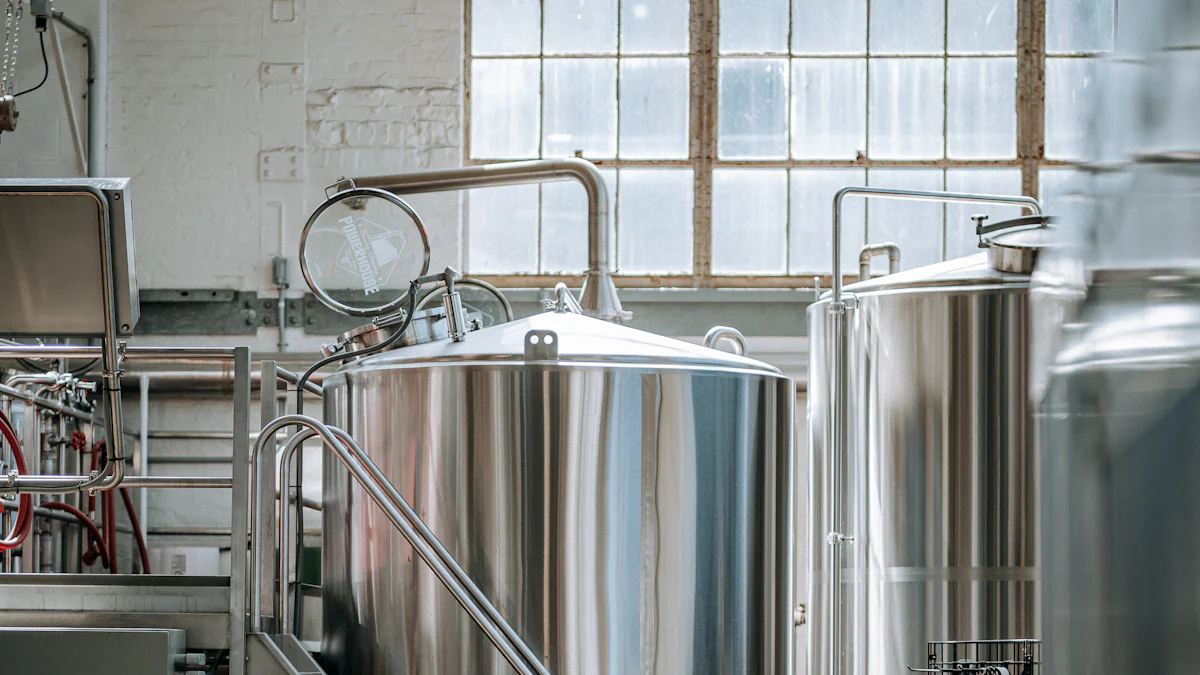
Maintaining the efficiency of your brewery fermenter involves regular descaling of heating elements. Mineral deposits, often referred to as scale, can accumulate over time. This buildup reduces the efficiency of the heating process and can even impart unwanted flavors to your beer. Understanding how to recognize and safely remove these deposits is crucial for optimal brewing performance.
Recognizing Scale Buildup
You need to identify scale buildup early to prevent it from affecting your brewing process. Scale appears as a white or grayish crust on the heating elements. It forms when minerals in the water, such as calcium and magnesium, precipitate out during heating. These deposits can insulate the heating elements, causing them to work harder and less efficiently.
- Visual Inspection: Regularly check the heating elements for any visible signs of scale. Look for any crusty or chalky deposits.
- Performance Monitoring: Notice any changes in heating efficiency. If your fermenter takes longer to reach the desired temperature, scale might be the culprit.
- Taste Testing: Be aware of any off-flavors in your beer. Burnt or metallic notes can indicate that scale is affecting the heating elements.
Expert Insight: Experts in brewing equipment maintenance emphasize the importance of regular inspections. They note that early detection of scale can prevent efficiency loss and flavor issues.
Safe Descaling Methods
Once you recognize scale buildup, you need to remove it safely to restore your fermenter’s efficiency. Using the right descaling methods ensures that you do not damage the heating elements or affect the quality of your beer.
- Choose the Right Cleaner: Use an acid-based cleaner to dissolve mineral deposits. Phosphoric acid solutions are effective and safe for brewing equipment.
- Prepare the Solution: Mix the cleaner according to the manufacturer’s instructions. Ensure the solution is at the recommended temperature for maximum effectiveness.
- Apply the Solution: Fill the fermenter with the cleaning solution. Ensure the heating elements are fully submerged.
- Allow Contact Time: Let the solution sit for the recommended duration. This step is crucial for dissolving the scale completely.
- Rinse Thoroughly: After descaling, rinse the fermenter thoroughly with hot water. Ensure all cleaning residues are removed to prevent contamination.
Pro Tip: Regular descaling not only maintains heating efficiency but also extends the life of your equipment. Experts recommend incorporating descaling into your routine maintenance schedule.
By recognizing and safely removing scale buildup, you ensure that your brewery fermenter’s heating elements operate efficiently. This practice not only enhances the performance of your brewing equipment but also contributes to the consistency and quality of your beer. Remember, well-maintained heating elements are key to brewing success.
Impact of Properly Maintaining Your Fermenter on Beer Quality
Proper maintenance of your beer fermenter plays a pivotal role in enhancing beer quality. By ensuring that your fermenter is in optimal condition, you directly influence the flavor, aroma, and overall quality of your beer. Let’s explore how maintaining your fermenter impacts these crucial aspects.
Consistency in Flavor and Aroma
Consistency in flavor and aroma is essential for any brewer aiming to produce high-quality beer. When you maintain your beer fermenter properly, you create a stable environment for fermentation. This stability allows you to replicate successful batches, ensuring that each brew meets your standards.
- Precise Control: High-quality equipment, like those from COFF, provides precise control over brewing parameters. This precision helps you achieve consistent results, batch after batch.
- Durable Materials: Using durable materials, such as stainless steel, prevents corrosion and contamination. This resistance maintains the purity of your beer, preserving its intended flavor and aroma.
An expert in brewery equipment once stated, “High-quality equipment ensures consistent taste and quality in your beer. It provides precise control over brewing parameters, allowing you to replicate successful batches.”
By focusing on consistency, you build a reputation for producing reliable and enjoyable beer, which is crucial for customer satisfaction and brand loyalty.
Reducing the Risk of Off-Flavors
Off-flavors can ruin an otherwise perfect batch of beer. Proper maintenance of your beer fermenter significantly reduces the risk of these unwanted flavors. Regular cleaning and sanitizing eliminate harmful microorganisms that can spoil your brew.
- Preventing Contamination: By keeping your fermenter clean and sanitized, you prevent bacteria and wild yeast from infiltrating your beer. This prevention is key to avoiding sour or metallic off-flavors.
- Efficient Equipment: Well-maintained equipment operates efficiently, reducing the likelihood of temperature fluctuations that can lead to off-flavors.
Experts recommend sourcing high-quality equipment from reputable suppliers like COFF to ensure durability and performance. This choice helps maintain the integrity of your brewing process.
By reducing the risk of off-flavors, you enhance the overall quality of your beer. This enhancement not only satisfies your customers but also sets your brewery apart in a competitive market.
Additional Maintenance Tips for Brewery Fermenters
Maintaining your brewery fermenter involves more than just cleaning and sanitizing. Proper storage and record-keeping are equally important. These practices ensure your equipment remains in excellent condition, enhancing the quality of your beer.
Proper Storage Practices
Storing your fermenter correctly prevents damage and prolongs its lifespan. Follow these steps to ensure your equipment stays in top shape:
- Clean Before Storage: Always clean and sanitize your fermenter before storing it. This practice prevents the transfer of flavors and odors from one batch to another.
- Dry Thoroughly: Ensure your fermenter is completely dry before storage. Moisture can lead to mold growth and corrosion.
- Choose the Right Location: Store your fermenter in a cool, dry place. Avoid areas with extreme temperatures or humidity, which can damage the equipment.
- Protect from Dust and Debris: Cover your fermenter to shield it from dust and debris. This protection keeps the interior clean and ready for the next use.
Proper storage practices not only extend the life of your equipment but also ensure efficient operation when you’re ready to brew again.
Keeping a Maintenance Log
A maintenance log is a valuable tool for tracking the upkeep of your fermenter. It helps you stay organized and ensures no maintenance task is overlooked. Here’s how to maintain an effective log:
- Record Every Cleaning and Sanitizing Session: Note the date and details of each cleaning and sanitizing session. This record helps you track how often maintenance occurs.
- Document Inspections and Repairs: Log any inspections, repairs, or replacements of parts like seals and gaskets. This documentation helps identify patterns and anticipate future needs.
- Schedule Regular Maintenance: Use the log to schedule regular maintenance tasks. Predictive maintenance tools can help prevent equipment failures that could compromise beer quality.
- Review and Update Regularly: Regularly review and update your log. This practice ensures all information is current and useful for planning future maintenance.
Keeping a maintenance log ensures that your fermenter remains in optimal condition, contributing to the production of high-quality beer.
By implementing these additional maintenance tips, you enhance the longevity and performance of your brewery fermenter. Proper storage and diligent record-keeping are essential components of a successful brewing operation. Remember, consistent maintenance is key to brewing success.
Promoting COFF’s Maintenance Solutions
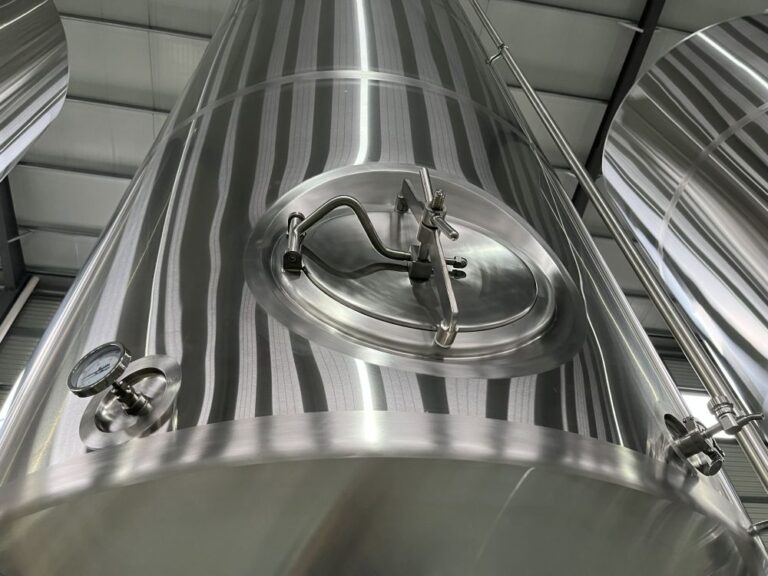
COFF’s Cleaning Products
When it comes to maintaining your brewery fermenter, COFF’s cleaning products stand out as top-tier solutions. You can rely on these products to keep your equipment spotless and free from contaminants. They are designed specifically for brewing environments, ensuring that your beer maintains its intended flavor and aroma.
- High-Quality Formulation: COFF’s cleaning products use advanced formulations that effectively remove organic and mineral deposits. This ensures that your fermenter remains in pristine condition after each use.
- User-Friendly Application: These products are easy to use, allowing you to clean your equipment efficiently. You can achieve thorough cleaning without spending excessive time or effort.
- Safety and Compliance: All COFF cleaning products meet industry safety standards. You can trust them to be safe for use in food and beverage production environments.
*Breweries worldwide praise COFF’s cleaning products for their effectiveness and reliability. By choosing COFF, you ensure that your fermenter receives the best care possible.*
COFF’s Maintenance Services
In addition to high-quality products, COFF offers comprehensive maintenance services tailored to your brewery’s needs. These services help you keep your equipment in optimal condition, enhancing both efficiency and product quality.
- Expert Technicians: COFF employs skilled technicians with extensive experience in brewery equipment maintenance. They provide expert care, ensuring that your fermenter operates smoothly.
- Customized Solutions: COFF understands that each brewery has unique requirements. They offer customized maintenance plans that address your specific needs, whether you run a small craft brewery or a large-scale operation.
- Preventive Maintenance: Regular maintenance services from COFF help prevent equipment failures. By addressing potential issues early, you avoid costly repairs and downtime.
COFF’s maintenance services have been recognized for their excellence and effectiveness. By partnering with COFF, you gain access to top-notch support that keeps your brewing process running seamlessly.
Choosing COFF for your cleaning and maintenance needs ensures that your brewery fermenter remains in excellent condition. With their innovative solutions and expert services, you can focus on what you do best—brewing high-quality beer.
FAQs
1. How important is properly maintaining your beer fermenter?
Proper maintenance of your beer fermenter is essential for producing high-quality beer. By keeping your fermenter in top condition, you ensure the longevity of your equipment and enjoy the satisfaction of crafting exceptional beer at home. Regular maintenance helps prevent contamination and equipment failure, safeguarding the flavor and aroma of your beer.
2. Why is proper maintenance of a beer fermenter important?
Proper maintenance ensures consistency in your brewing results. By keeping your equipment clean and sanitized, you reduce the risk of off-flavors and spoilage. This allows you to enjoy the fruits of your labor with confidence, knowing that each batch will meet your standards.
3. What are the benefits of maintaining a beer fermenter properly?
Maintaining your beer fermenter properly plays a significant role in producing high-quality beer. A well-maintained fermenter creates optimal fermentation conditions, avoids contamination, and lets you craft beer with the desired flavor profile and aroma. This practice not only enhances the brewing process but also protects your investment in brewing equipment.
4. How often should I clean and sanitize my fermenter?
You should clean your fermenter after each use to remove any residual materials that could affect future batches. Daily cleaning routines help prevent residue buildup, while deep cleaning should be done periodically, depending on how frequently you brew. Sanitizing should occur before each use to eliminate harmful microorganisms.
5. What products should I use for cleaning and sanitizing?
For cleaning, use a mild dish soap or brewery-specific cleaning agents like PBW (Powdered Brewery Wash). For sanitizing, consider using Star San, Saniclean, or Iodophor. These products effectively kill bacteria and wild yeast without leaving residues that could affect your beer’s flavor.
6. How can I ensure my fermenter’s seals and gaskets are in good condition?
Regularly inspect seals and gaskets for signs of wear and tear, such as cracks or brittleness. Replace any damaged components promptly to prevent leaks and maintain the integrity of your brewing process. Using high-quality replacements from reputable suppliers like COFF ensures durability and performance.
7. What should I do if my fermenter’s thermometers and gauges are inaccurate?
Calibrate your thermometers and gauges regularly to ensure accurate readings. Use a reliable reference tool to compare readings and adjust your fermenter’s instruments as needed. If you encounter issues like inconsistent readings or a stuck needle, troubleshoot and resolve them quickly to maintain your brewing process.
8. How can COFF help with maintaining my brewery fermenter?
COFF offers high-quality cleaning products and comprehensive maintenance services tailored to your brewery’s needs. Their expert technicians provide customized solutions and preventive maintenance to keep your equipment in optimal condition. By partnering with COFF, you gain access to top-notch support that enhances your brewing process.
Properly maintaining your brewery fermenter is essential for producing high-quality beer. By implementing routine inspection and maintenance, you ensure consistency in your brewing results and reduce the risk of off-flavors and spoilage. Regular maintenance not only enhances the brewing process but also extends the life of your equipment. Embrace these practices to safeguard your beer’s flavor and aroma. COFF stands ready to support you with top-notch maintenance solutions, ensuring your brewing journey remains smooth and successful.

